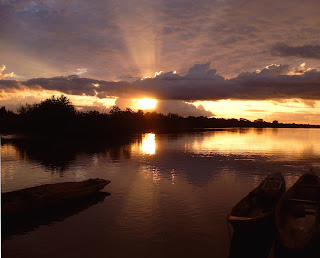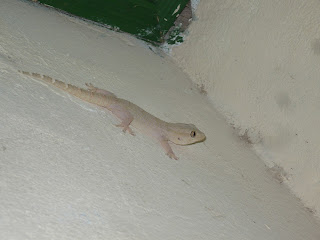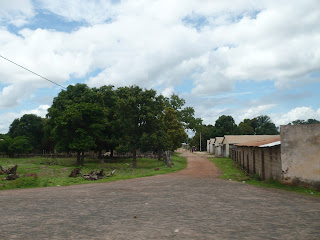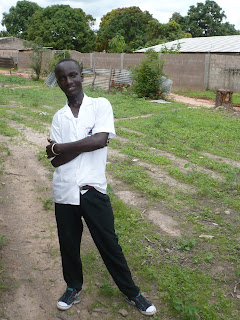I know that when I was waiting to leave for our staging, I was obsessed with our packing list. I wanted us to be prepared, but not too prepared. I wanted to travel light, but to have essential items available... So, here are my thoughts (after nearly 10 months) on what is appropriate to bring to West Africa when you plan to stay for 27 months:
First, and most importantly, Peace Corps training involves a lot of moving around. The smartest thing to do is bring 2 bags - one larger, hard-sided, lockable suitcase with wheels and one smaller bag (we had duffel bags - some people prefer mid-size backpacks). This way you can shut all the stuff you don't really need up in the suitcase, which will be relatively secure (and rodent proof), and carry your essentials in a smaller, lighter bag.
Secondly, you can get most stuff here. The quality might be questionable in some cases or the price might hurt your budget a little, but there's no need to bring a 2 year supply of anything unless you're very picky.
So, in hindsight, I would bring only enough shampoo, conditioner, toothpaste, soap, etc. to get through the first few months. I would bring a small amount of American dollars (even $20 would be fine) to supplement your training allowance, because it is nearly impossible to afford the absolute essentials on what they give you, let alone anything extra. Once you are a volunteer, no problem.
Here are the things I am really glad I brought:
Diva cup.
Decent dental floss.
A flash drive.
Converter for outlets.
Camera.
Leatherman.
2 nice quality cotton double or queen size sheets and a pillowcase.
Nalgene bottle (or 2).
1 or 2 sharp knives (the Victronix paring knives are great).
prints of photos from U.S. to show host family.
tote bag
bathing suit.
bathing suit.
a sweatshirt.
long PJ pants and also short ones.
nail polish in cool colors. (you can buy remover in Kombo)
headlamp and a collection of decent quality batteries to go in it.
enough long skirts, t-shirts and nice-ish clothes to get through training.
smallish travel pillow.
a few pairs of capri length tights for wearing under skirts/dresses.
plastic accordian file to organize ridiculous amounts of paperwork in.
plastic accordian file to organize ridiculous amounts of paperwork in.
Wish I brought:
laptop. (Mine wasn't working so well when we left and I didn't want to worry about it, but most volunteers have them and use them a lot!).
small things to give as a gifts during training (people had birthdays and no one had money or the means to buy them gifts) - some U.S. candy would be good for this.
more bras and underwear (especially quick-dry material).
a few more t-shirts and nice-ish clothes. This is tricky though, because I lost a lot of weight and ended up giving away many items I brought which no longer fit.
more decent pens.
set of different colored Sharpie markers.
more AfterBite.
mascara and lipstick.
mascara and lipstick.
Glad I didn't bring:
giant amounts of food/snacks (though a few bags of a favorite candy or tea are nice to have).
raincoat.
fancy gadgets, including solar charger (they're pretty easy to buy off volunteers who are on their way out and, in my personal experience, a lot of them just don't work that well)
cell phone (Peace Corps gave us ours and they are fine)
Would just as soon have not brought:
umbrella (lost it- and they're easy to buy here)
towels (smell really bad during rainy season - a wrap skirt works much better)
too may pairs of shoes
a watch and travel alarm clock (my cell phone is good enough)
flashlight (cell phone and headlamp are good enough)
-Colette (Darrin can weigh in on this one in a seperate post)
cell phone (Peace Corps gave us ours and they are fine)
Would just as soon have not brought:
umbrella (lost it- and they're easy to buy here)
towels (smell really bad during rainy season - a wrap skirt works much better)
too may pairs of shoes
a watch and travel alarm clock (my cell phone is good enough)
flashlight (cell phone and headlamp are good enough)
-Colette (Darrin can weigh in on this one in a seperate post)



















































